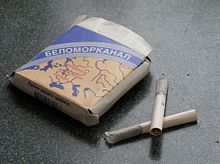Belomorkanal
 An old box of Russian Belomorkanal cigarettes with a Russian text warning at the bottom of the pack | |
| Product type | Cigarette |
|---|---|
| Owner | Uritsky Tobacco Factory |
| Country | Leningrad, Soviet Union |
| Introduced | 1932 |
| Markets | See Markets |
| Carcinogenicity: IARC group 1 | |
Belomorkanal (Russian: Беломорканал) is a Russian brand of papirosa (cigarettes), originally made by the Uritsky tobacco factory in Leningrad, Soviet Union.
History

Belomorkanal was created in 1932 to commemorate the construction of the White Sea–Baltic Canal, also known as the Belomorkanal.[1][2] Vasily Iohanidi, a process engineer, developed the tobacco blend, and Andrey Tarakanov drew the pack design.[3]
Belomorkanal cigarettes are still produced in various post-Soviet republics, most notably in Russia, in Kamianets-Podilskyi (Ukraine), and in Hrodna (Belarus).
Belomorkanal is also used by cannabis users, wherein "emptied cigarettes are then filled with a mixture of tobacco and marijuana for smoking",[4][5] with the cardboard tube serving as a built-in roach.
Markets
Belomorkanal cigarettes were widely available in the Soviet Union. They are still sold in some post-Soviet states, including Russia, Belarus and Ukraine.[6][7][8]
In popular culture
In a 1985 song by Jan Krzysztof Kelus, the name of the cigarettes is compared to Auschwitz Filters due to the fact that many thousands of Gulag prisoners had died during the construction of the canal.[9]
Nicolas Rothwell's 2013 novel Belomor takes its name from this cigarette.[10]
In Simon Sebag Montefiore's WW2-set novel Red Sky at Noon (2017), it is stated that Belomorkanals were reserved for officers.
Belomorkanal cigarettes are smoked by Major General Oleg Turbin, commander of the 12th Guards Tank Division in the Cold War novel The Red Effect (2013) by Harvey Black.
See also
References
- ^ "Les Zeks du Canal de la mer Blanche : photographies" by Anne Brunswic and Nicolas Werth, Institut d'histoire du temps présent, 9 May 2015 (in French)
- ^ "Russia Marks 80th Anniversary of Opening of Belomorkanal", Radio Free Europe/Radio Liberty, 2 August 2013
- ^ Bachurin, Mikhail. "Купите папиросы!" (in Russian). PakkoGraff #6, 2008. pp. 58–61.
- ^ Dineeva, Nelly Rod (December 1999). "Adolescent Narcotism in Russia". Heroin Addiction and Related Clinical Problems. 1 (2). p. 30. ISSN 1592-1638
- ^ Larsen, Dana (2004-02-24). Grow Like a Pro: The Marijuana Advantage. Ed Rosenthal. ISBN 978-0-932551-60-3.
- ^ "Belomorkanal".
- ^ "Brands".
- ^ "Brands".
- ^ Jan Krzysztof Kelus; Tomasz Kobyliński (1985). "Papierosy Biełomor-Kanał" [Belomorkanal Cigarettes]. kelus.art.pl (in Polish). Warsaw: Polkobex. Archived from the original on 2012-04-02. Retrieved 2011-09-15.
Tak, Heinz, Kanał Białomorski/ – nie ma co się łudzić –/ tam zginęło tak najmarniej/ pół miliona ludzi/ Powiedz Willy – jako Niemiec/ chyba byś się zrzygał/ płacąc za Auschwitze z filtrem/ markę i feninga
- ^ "Belomor by Nicolas Rothwell – review" by Alex Clark, The Guardian, 12 December 2013
External links
- Belomorkanal Cigarettes
- History of Belomorkanal (in Russian)
